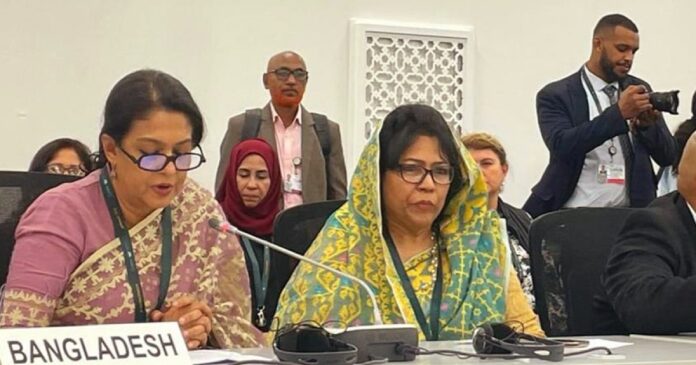Adviser to the Ministry of Environment, Forests and Climate Change Syeda Rizwana Hasan called on the world community for legal recognition of rights to water, land, food and environment. He also emphasized on the implementation of proper surveillance in the production process to control international trade and border crossing of agrochemicals.
According to the press release sent by the ministry, the Environment Advisor said this while giving the National Statement on behalf of Bangladesh at the COP-16 'Formal Statement' session of the ongoing United Nations Convention to Combat Desertification in Riyadh, Saudi Arabia's capital, on Tuesday (December 3).
He said- People's support is essential for financial support, technology transfer and capacity building, but this support should be stopped for water dependent industries or unsustainable agricultural practices. As a low basin country, Bangladesh wants regional cooperation in river basin management. UNCCD COP-16 will help to set the right political vision at the global and national levels towards the goal of a world free from land degradation.
Highlighting the challenges of Bangladesh, he mentioned that only 14.8 million hectares of land have to ensure food for 170 million people, which is one of the countries with the lowest land availability in the world. One-third of the country's land could be lost by 2050 due to sea-level rise, further threatening food security. Land pollution has increased due to excessive use of groundwater and agrochemicals.
He also said that Bangladesh being an active delta region, more than 1 million people become homeless every year due to river erosion. The country loses 2.6 percent of its forest cover every year, double the global average. Salinity in coastal areas has reached dangerous levels in the last three decades. Permanent waterlogging has increased as a result of reduction in water flow and changes in river course in 57 transboundary rivers.
Syeda Rizwana Hasan called on the world community to work together to establish environmental and climate justice, saying it is necessary to take ambitious steps to protect the earth and limit the temperature to 1.5 degrees, considering the adaptation limitations.
Environment Secretary Dr. Farhina Ahmed was also present in this session.

